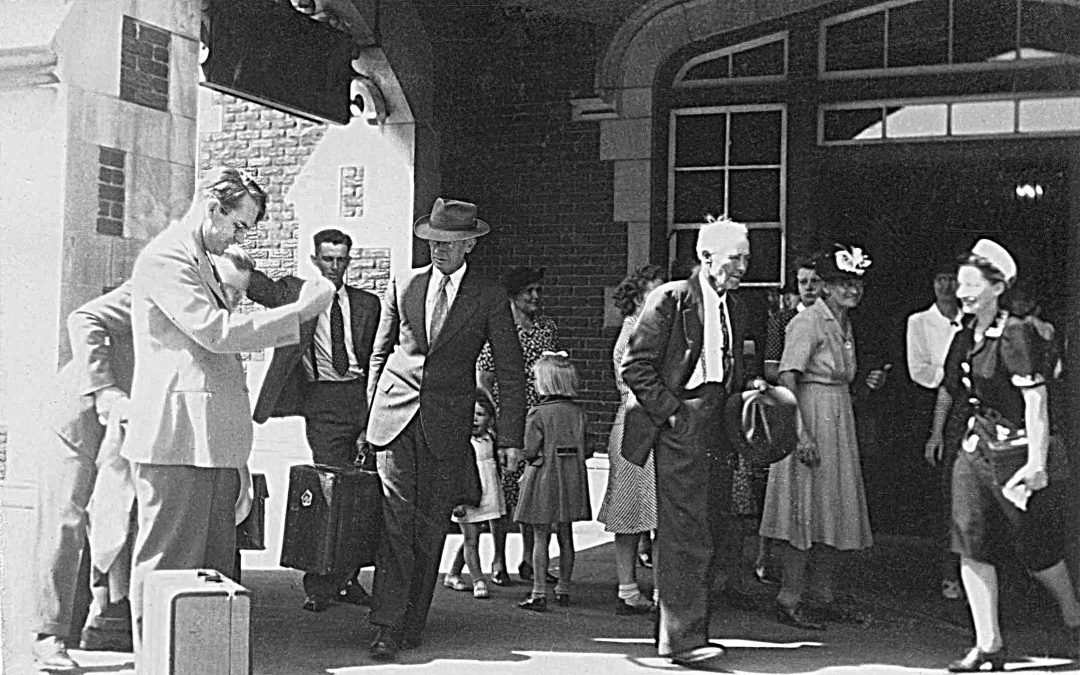My father — front left. My mother — front right. The day after their wedding, at the Newton, KS train station, leaving for Paraguay in 1943
When I was a kid, my dad was my hero-doctor. He stitched up my chin three times after I fell again and again and broke it open, he removed my swollen tonsils, and he dug pinworms out of my butt.
But was I there for him when he was in pain?
Some of you know that my husband and I are doing research for a book about the life and work of my Mennonite medical missionary parents, John and Clara Schmidt. We’re wading through a mountain of materials documenting their lives, including diaries, letters, newspaper articles, books and newsletters.
We’ve read and have recorded events from the 1940s, when they married and — the day after their wedding — traveled to a barren vast, nearly unlivable desert in west Paraguay to be the only doctor and nurse for large colonies of German Mennonites who had recently emigrated/escaped from Russia.
Then we got to the chapters of their lives, in the 1950s and 1960s, when they founded and ran a leprosy station in east Paraguay. They were the first to treat patients in their homes, rather than locking them up in a leper colony, thus pioneering how leprosy is treated on the planet today. The Mennonite colonies they had served back in the 1940s became one of their primary sponsors in this leprosy work.
During the past few weeks, we’ve been reading material documenting events that happened in the late 1960s and early 1970s.
And it keeps bringing me to tears.
My parents were passionate about treating leprosy patients with dignity and respect. “The worst part about leprosy,” my dad writes again and again in different ways, “is not the sickness itself. It’s not the oozing wounds, the crippled feet, not the swollen and disfigured faces. It’s not even the persistent fever and pain. For leprosy patients, the worst part is the emotional and social pain of isolation, stigma and rejection. They have been cast out as untouchables. And it is our duty to treat them as whole and dignified people who have an illness that is not their fault.”
Over and over again I read about my father’s insistence that providing medical treatment for the patients was only a tiny piece of what they really needed.
Committed to the overall health of his patients and their Paraguayan neighbors, my dad rode his horse from village to village, teaching the people about the importance of toilets, and showing them how and where to build them (not the shiny-white-porcelain kind, but rather the stinky-hole-in-the-ground kind). My mother taught them how to grow vegetables and how to sew clothes without a sewing machine. My parents even collected donations to buy a plot of land, on which cast-out patients could have a place to call home.
In 1971, for a number of reasons we will describe in detail in our forthcoming book, the leaders of the Mennonite colonies asked John and Clara to leave the work they had pioneered for 20 years. To replace them, they chose a smart young plastic surgeon who had grown up in their midst and had studied in Argentina. He promised to move beyond the more basic medical and social care my parents had been providing, by also beautifying the poor disfigured, ugly patients.
Plastic surgery is so much sexier than toilets and vegetable gardens! Can one really blame the board members who voted to replace my parents’ leadership?
But couldn’t both approaches have worked in tandem?
Knowing my father, I suspect he was too stubborn to even consider that possibility.
The pain of the rejection oozes between the lines my parents write about how grateful they are for the support they received from the colonies during the prior 20 years. It drains the life from their attempts to write cheerfully about their next chapter of service elsewhere in Paraguay.
They were suffering. And I hardly noticed.
Sure, I was surprised that they left their life’s passion of running the leprosy station when my dad was only 60. But I never stopped to ask them why, really why, underneath all of the “It is God’s will” and “There are other wonderful places to serve.”
I was not an easy child to raise, and I caused my parents a lot of grief. That’s relatively easy to forgive. I was only a kid, after all.
But I was no longer a child when I really and truly failed my parents.
In 1971, I was married and pregnant with my first child. I was preoccupied with the business of trying to be a good wife and mother. In the process, I was an inattentive daughter of parents who were in deep pain and needed my care.
Today, I feel remorseful and sad. I would take their pain away, grab it back from the past, if I could.


Like Marlena I too feel “remorseful and sad” about the way I often related to my parents as well as to others who deserved better from me during my early years. I suspect that many of us reflecting back from our current perspectives and values can say the same.
The tricky question for me today is whether the way I am currently relating to people, were I blessed with decades more to mature further, would seem any less embarrassing in retrospect. Maybe we always did the best we could. Yes, I’m clear I would not make those same mistakes again, the ones that haunt me from my early decades. However, am I committing another set of errors that would look just as egregious in retrospect?
I could not resist commenting. Exceptionally well written!
Thank you!